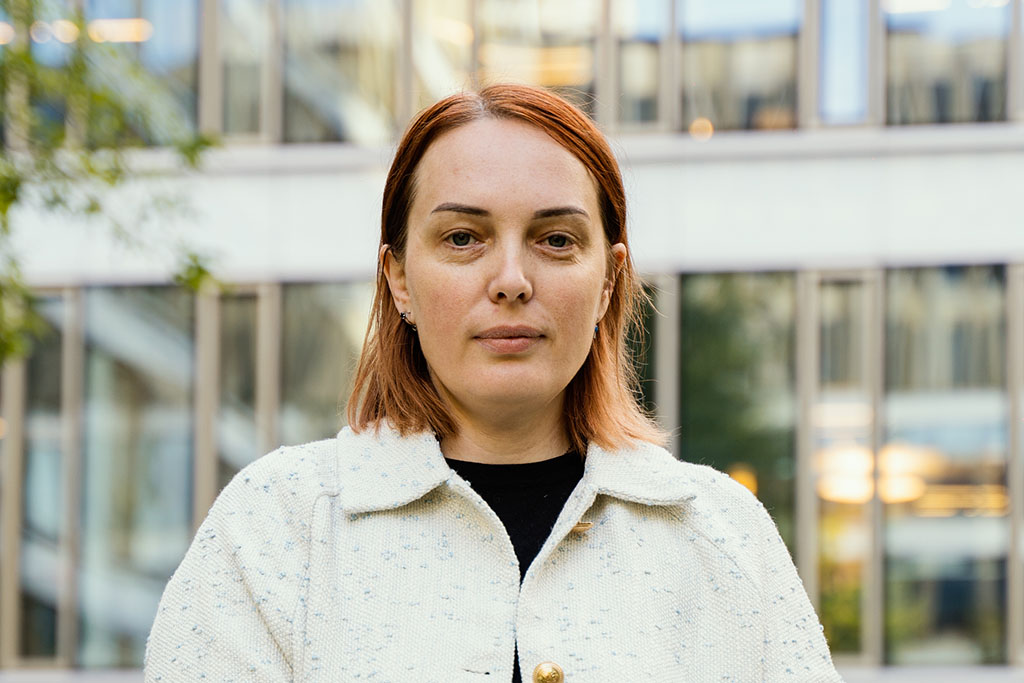“We are really saving lives”
A better and safer world for women—that was the goal when the organisation Slavic Heart was founded. Today, they offer legal and psychosocial support to victims and survivors of gender-based violence in Ukraine.

When Russia first invaded Ukraine in 2014 , there was a big need for assistance in the Donetsk region located in the eastern part of the country. This was the starting point of The Kvinna till Kvinna Foundation’s partner organisation Slavic Heart, which was founded by six internally displaced women who wanted to make the world better and safer for women and girls.
“We were receiving a lot of internally displaced people, like elderly people, pregnant women, children and people with disabilities,” says Kateryna Khaneva, programme manager at Slavic Heart.
Even though they had their own challenges and problems, they got to know each other. They realised that they needed to do something to help people, but at the time, they didn’t know exactly what that meant. Humanitarian aid and humanitarian work was unfamiliar to them—they just knew they wanted to help.
With the support of their already existing networks, they reached out to people who could really help, and so their work began.
Work against gender-based violence on different levels
When describing the work of Slavic Heart, Kateryna says it can be divided into three different directions: humanitarian aid, protection of human rights related to gender-based violence and the full-scale invasion as well as the protection of children and elderly people.
When it comes to gender-based violence, Slavic Heart works on different levels. One level is through their case management where women can receive legal support from law attorneys and lawyers. The women can also receive psychosocial support.
Another level focuses on education and training for representatives of the state response system. Through this education, they receive knowledge about gender stereotypes, Ukrainian legislation, and international standards. They also receive information on how to respond to cases of gender-based violence and conflict-related sexual violence and adapt their work to provide better services for survivors.
They also work with mobilising women activists in different communities. The activists have basic knowledge about gender-based violence, how to identify if someone is subjected to gender-based violence and how to help that woman. They organise activities and safe spaces for different groups of women, for example elderly women, Roma women, LGBTQ women and women living with HIV, to be able to meet and share experiences. They also have specific activities for specific groups of women.
Reports on sexual violence
In the beginning of the full-scale invasion, Slavic Heart saw numerous cases of conflict-related sexual violence committed against women and children. For Slavic Heart, the work to document and raise awareness about the issue had only begun. Unfortunately, it’s difficult to know the exact number of victims and survivors of sexual gender-based violence. Kateryna believe that there is an invisible group of women who are not ready to talk about what they have been subjected to—perhaps they never will either.
“We don’t have enough services in our country to be able to give them the professional support they need. These are very specific and sensitive cases.”
Depending on the nature of the perpetrator, there are different challenges for the women to get justice. For example, it can be easier to find and name the perpetrator if it is a Ukrainian soldier, but it comes with a challenge—Ukrainian soldiers are seen as heroes in society, people who die for Ukraine’s freedom.
“We know some cases when the aggressors were Ukrainian soldiers and it was easier to identify them, but I don’t think our country do that. They will not raise this question.”
The power of strong networks
The power of organising and women coming together is something that permeates all of Slavic Heart’s work. Kateryna states that it is the organisation’s biggest success.
“When the full-scale invasion started, all international organisations, all donors, all of them, left Ukraine. […] But we gathered, connected to help people. And we survived. If we don’t have this connection, we would die.”
Kateryna knows many women in different cities and countries who support each other. They are change-makers, making a difference at all levels in society. All the women activists in Slavic Heart’s network work on a volunteer basis. Many people who have experience within professional response to gender-based violence, have left Ukraine. This means that the women activists who are still present, struggle to give support to victims and survivors of gender-based violence.
“They don’t have enough people, knowledge or money to do this work, because almost all money goes to other priorities,” Kateryna explains.
Even if the international organisations came back, Kateryna says that they are not focused specifically on women.
“That’s why we must gather and be powerful. In order to be heard, to be understood and to tell our needs. Thanks to the support from Kvinna till Kvinna, we can build and support those networks.”
“When I say that we are saving lives, it’s not a figurative meaning—we are really saving lives,” says Kateryna.
Kvinna till Kvinna has supported women’s rights in Ukraine since 2014. Learn more about our work in Ukraine »